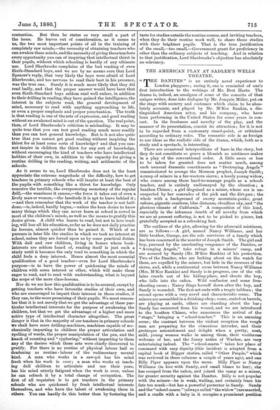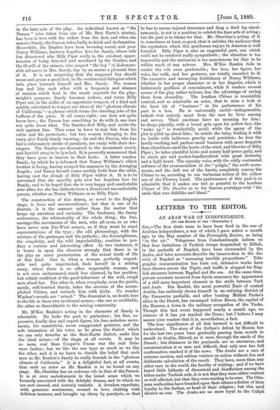THE AMERICAN PLAY AT SADLER'S WELLS THEATRE.
" THE DANITES " is an entirely novel experience to London playgoers ; seeing it, one is reminded of one's first introduction to the writings of Mr. Bret Harte. The drama is, indeed, an amalgam of some of the conceits of that unique writer, done into dialogue by Mr. Joaquin Miller, put on the stage with scenery and costumes which claim to be abso- lutely accurate, and played by Mr. Mae") Rankin, a dis- tinguished American actor, and his company, who have been performing in the United States for some years in con- cert. In the freshness and novelty of the play, and the manner of its presentation, consist its attraction ; for it is not to be regarded from a customary stand-point, or criticised according to ordinary rules. The romantic side is as foreign to our ideas as the realistic side of the drama, which, both as a study and a spectacle, is interesting.
There are occasional interpositions of haze in the story, bat they do not constitute so grave a blemish as mistiness makes in a play of the conventional order. A little more or less to be taken for granted does not matter much, among such unusual dramatic constituents as "Destroying Angels " commissioned to avenge the Mormon prophet, Joseph Smith ; a camp of miners in a far-western sierra; a lovely young widow, who comes among these hard-to-manage pupils as a school-
teacher, and is entirely undismayed by the situation ; a heathen Chinee ; a girl disguised as a miner, whose sex is un- suspected by her comrades of the pick and the dirt-pan ; the whole with a background of snowy mountain-peaks, great caiions, gigantic conifer's, blue distance, cloudless sky, and "the glorious climate of California." A composition of this kind, especially in the inhuman dearth of all novelty from which we are at present suffering, is not to be picked to pieces, but gratefully accepted as a refreshing fact.
The outlines of the plot, allowing for the aforesaid mistiness, are as follows :—A girl, named Nancy Williams, and her little brother, George, are the sole survivors of a family which has been concerned in the murder of Joseph Smith. The girl and boy, pursued by the unrelenting vengeance of the Danites, or "Avenging Angels," take refuge in a miners' camp, and are assured by Sandy (Mr. M‘Kee Rankin) of his protection. Two of the Danites, who are lurking about on the watch for them, are expelled by the miners, but hide in the recesses of the sierra, and, while a sentimental scene between Nancy Williams (Mrs. M'Kee Rankin) and Sandy is in progress, one of the vil- lains crawls out of his hiding-place, and shoots the boy, who falls into the callon. Wild confusion and some free- shooting ensue ; Nancy flings herself down after the boy, and Sandy is wounded. The first act ends with a tragic tableau ; the second opens with a very novel and characteristic scene. The miners are assembled in a drinking-shop; some, seated on barrels, are playing at cards, others are standing about the bar; Sandy has recovered from his wound, and we are introduced
to the heathen Chinee, who announces the arrival of the "stage," bringing a "school-teacher." This is an amusing scene; the contrast between the violent reception the rough men are preparing for the obnoxious intruder, and their grotesque astonishment and delight when a pretty, neat, mild, young woman walks in among them, their vociferous welcome of her, and the funny antics of Washee, are very entertaining indeed. The " school-marm " takes her place of command with easy dignity (this incident is adapted from a capital book of Digger 'dories, called "Other People," which was reviewed in these columns a couple of years ago), and one Billy Piper appears upon the scene. Billy Piper Is Nancy Williams (in love with Sandy, and small blame to her) ; she has escaped from the cailon, and joined the camp as a miner, for greater security against the Danites. Billy is not popular with the miners—he is weak, wailing, and certainly fears his fate too much—but has a powerful protector in Sandy. Sandy andthe " school-mann " (always called "the widow ") are married, and a cradle with a baby in it occupies a prominent position in the Later acts of the play. An individual known as "the Parson" (also taken from one of Mr. Bret Harte's stories), has been in love with the widow from the first, and when she marries Sandy, the Parson takes badly to drink and declamation. Meanwhile, the Danites have been hovering round, and poor Nancy Williams, between hopeless love for Sandy, whose wife has discovered who -Billy Piper really is, the constant appre- hension of being detected and murdered by the Danites, and the of the miners, who suspect "the boy" of dishonour- able advances to Mrs. Sandy, has by no means a pleasant time of it. It is not surprising that the supposed boy should moan and groan a good deal, in the sentimental dialogues which take place between himself and Mrs. Sandy. The women hug and kiss each other with a frequency and absence of caution which lead to the result requisite for the play- wright's purpose; Sandy becomes jealous, and turns Billy Piper out, in the midst of an opportune tempest, of a kind and quality calculated to temper our ideas of the "glorious climate of California,"—a phrase which forms the standing joke of the buffoon of the piece. It all comes right; one does not quite know how ; the Parson has something to do with it, one does not quite know what. The Danites find Billy, and excite the mob against him. They come in force to tear him from his cabin and his protectors ; but two women belonging to the camp give Sandy timely warning,—he and the Parson, who has had a reformatory stroke of paralysis, are ready with their der- ringers. The Danites are denounced to the inconstant crowd, and hurried away to be lynched. It is presently announced that they have gone to heaven in their boots. A letter reaches Sandy, by which he is informed that Nancy Williams's eldest brother is living, having escaped the massacre by the Avenging Angels ; and Nancy herself comes meekly forth from the cabin, having cast the slough of Billy Piper within it. It is to be presumed that she speedily gets over her hopeless love for Sandy, and to be hoped that she is very happy and comfortable ever after, for she has hitherto been a dismal and uncomfortable person, whether as Nancy Williams or as Billy Piper.
The construction of this drama, so novel to the English stage, is loose and unconventional ; but that is one of its charms,—it is the manner rather than the matter that keeps up attention and curiosity. The freshness, the funny seriousness, the whimsicality of the whole thing; the free, unstage-like movements of the men, who all seem, to us who have never seen Far-West miners, as if they must be exact representations of the type ; the odd phraseology, with the mixture of the grotesque and the pathetic ; the downrightness, the simplicity, and the wild improbability, combine to pro- duce a curious and interesting effect. In two instances, it is borne in upon the observer strongly that there is in the play an exact presentation of the actual truth of life of this kind. One is, when a woman, perfectly respect- able and quite unprotected, finds herself in a mining camp, where there is no other respectable woman, and is not even embarrassed, much less alarmed, by her position, but calmly confident of the good-behaviour of the wild, rough men about her. The other is, when everybody, even the gentle, manly, soft-hearted Sandy, takes the services of the accom- plished Chinee, and rewards him with kicks. No wonder Washee's morals are "mixed." The dramatist is, no doubt, true to the life in these two incidental scenes,—the one so creditable, the other so discreditable to the mining community.
Mr. 3.1•Kee Rankin's acting in the character of Sandy is admirable. He looks the part to perfection ; his fine, ex- pressive, kindly face and superb figure, his free, noiseless move- ments, his unartificial, never exaggerated gestures, and the soft intonation of his voice, as be gives the dialect which we can only describe as the Bret-Harte dialect, make him the ideal miner,—of the stage, at all events. It may be no more real than Cooper's Micas was the real Dela- ware Indian; but we like the one type as much as we like the other, and it is no harm to cherish the belief that such men as Mr. Rankin's Sandy do really flourish in the "glorious climate of California." It is a delightful fact, at all events, that such an actor. as Mr. Rankin is to be found on any stage. Mr. Sheridan has an arduous rine in that of the Parson. It is at once melodramatic in the broad sense which we formerly associated with the .A.delphi drama, and to which we are now unused, and coarsely realistic. A drunken reprobate, with generous sentiments, crossed in love, shaking with delirium tremens, and brought up sharp by paralysis, so that he has to rescue injured innocence and drag a dead leg simul- taneously, is not in a position to exhibit the finer arts of acting ; but the part is to blame for that. Mr. Sheridan's acting of it is, sometimes at least, so good, that it satisfies the audience that the reputation which this gentleman enjoys in Anierica is well founded. Billy Piper is also an ungrateful part, one which could not be rendered really sympathetic ; the situation is too impossible and the sentiment is too monotonous for that to be within reach of any actress. Mrs. M'Kee Rankin fails to render the role even pardonable; her face, her figure, her voice, her walk, and her gestures, are totally unsuited to it. The excessive and unvarying dolefulness of Nancy Williams, whether in her proper character or in her disguise, which is ludicrously guiltless of concealment, while it renders several. scenes of the play rather tedious, has the advantage of saving them from absurdity. The heathen Chinee is irresistibly comical, and so admirable an actor, that to miss a look or the least bit of " business " in his performance of his part is a loss. He is universally useful—indispensable, indeed—bat entirely apart from the race he lives among and serves. Their emotions have no meaning for him; he sleeps placidly, with a broad grin upon his yellow face (the "make up" is wonderfully good) while the agony of the plot is piled up about him ; he minds the baby, feeding it with its bottle with ludicrous gravity and precision; he does the family-washing and parlour-maid business with more despatch than cleanliness amid the howls of the wind, and likewise of Billy Piper ; he takes plentiful kicks and scanty half-pence gaily, and he steals gin and pocket-handkerchiefs with great dexterity and a light heart. The squeaky voice, with the oddly contrasted softness of the pronunciation of the "pidgin," the swift move- ments, and the deft use of the hands, completely convey the Chinee to us, according to our barbarian notion of the yellow son of the Flowery Land. The performance of this part is so admirable that it makes one feel as grateful to the heathen Chinee of The Danitea as to his famous prototype with "the
smile that was childlike and bland." _



































 Previous page
Previous page